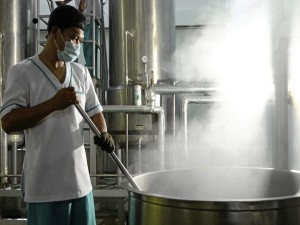DUMAGUETE CITY— Most planters here tend to use the bleakest of terms in describing recent developments in the sugar industry.
A 50-kilo bag of sugar recently fetched a price barely half the P2,600 it commanded last year. Costs of diesel fuel, wages and spare parts have also increased.
Planters now worry about oversupply and smuggling of sugar. Moreover, there is the “zero tariff” on imported sugar under the Asian Free Trade Agreement (Afta), which will take effect in 2015.
But one sugar planter in Negros Oriental manages to keep his head above water by going into niche marketing.
Export market
Alejandro Florian Alcantara, a lawyer and certified public accountant, has started selling “muscovado,” also known as “poor man’s sugar,” to Asian and European markets.
His Brown Sugar Milling Co. Inc. (RBSMCI) in Barangay Igbalanac, Pamplona, has become only the third company to penetrate the export market out of 300 muscovado producers in the country today
In 2007, Alcantara, a sugar planter for over 15 years, decided to build his own sugar mill to save on the 33.5-percent toll fee charged by other mills in Negros Oriental and to protect his investments once Afta’s sugar provision goes into full swing.
His interests led him to Rene Burt Llanto, director of the Department of Science and Technology (DOST) in Central Visayas, and to Dr. Nuna Almanzor of the Industrial Technology Development Institute (ITDI).
On Aug. 22, 2009, then Science Secretary Estrella Alabastro gave the key of the 90-ton capacity muscovado factory to Alcantara in a simple ceremony in Pamplona.
Shortly after it started operating, RBSMCI participated in the International Food Exhibition (Ifex) Manila sponsored by the Center for International Trade, Exposition and Mission (Citem) in May 2010.
ALEJANDRO Florian Alcantara, Raw Brown Sugar Milling Co. Inc. president (left), reviews the day's work with production manager Jose Miguel V. Bengoechea, chief of processing Tim Kenneth Aguilar and sanitation and food safety head Cristalyn S. Alcantara at the sugar mill in Igbalanac, Pamplona town, Negros Oriental.
It was one of three food companies in the Philippines chosen from over 100 firms to join the Asean Japan Center in Tokyo and the Asean Korea Center in Seoul that same year.
Foreign contacts
Abroad, Alcantara learned that what most people here considered to be “poor man’s sugar” was actually a special commodity in developed countries.
Unlike refined sugar, which is subject to fluctuating prices in the world market, the price of muscovado has been stable over the past several years.
Alcantara’s new contacts abroad enabled him to start exporting “organic certified” muscovado immediately after his products first rolled off his factory in February 2010.
To date, exports to Japan, Korea, Russia and Taiwan account for 90 percent of RBSMCI’s production, while only 10 percent is distributed locally.
“The government has been a big help to my operation—from the design, cleaner technology and marketing—in helping me penetrate the very discriminating markets in Asia,” Alcantara says.
Inspired by his success, the Negros Oriental Chamber of Commerce Inc., DOST, the Department of Trade and Industry, and AFOS Foundation for Entrepreneurial Development Cooperation—a nonprofit organization founded by the Federation of Catholic Entrepreneurs of Germany—helped RBSMCI in preparing for International Standards Organization (ISO) 22000 certification-Food Safety Management System (FSMS).
In March last year, RBSMCI joined the Philippine delegation led by Menandro Ortego of the Philippine Trade Training Center (PTTC) for a two-week training program on Food Safety and Quality Standards and Regulations in Japan.
To make the mill competitive in the global market, RBSMCI recently completed the draft manual for Hazard Analyzing Critical Control Points (HACCP) seminar.
Good practices
It also obtained the current Good Manufacturing Practice (GMP) manual and the Sanitation Standard Operating Practices (SSOP).
HACCP teaches food industries to prevent food contamination within the process flow, while GMP certifies company observance of hygienic practices among employees in its environment.
“The HACCP and GMP are important tools to guarantee food safety because buyers usually conduct factory audits and see if we comply with these global standards,” Alcantara explains.
To date, he says, RBSMCI has been sending one 20-foot container of muscovado abroad each month.
Success stories like Alcantara’s may yet be the exception to the rule. But he and his 40 employees, no doubt, are charting the direction the sugar industry may take in the years to come.
